Philip Goddard's Bookstore
Also visit Philip Goddard's other stores
Contents
Introductory Notes
This is where you can buy copies of all of Philip Goddard's published literary works — novels, short stories and poetry — as commercially produced paperback books and Kindle e-books.
Each of the novels, together with some of the short stories and even some of the poetry, has been composed as though it were a tightly organised work of music, in which particular ideas, turns of phrase and even individual words are treated as though they are melodic motifs in a complex symphony, in which the organic development and interrelationships between the different threads results in a dramatic impact that goes well beyond what just narrative itself could do.
Indeed, some people have suggested that this mode of writing, whether in prose or poetry, is altogether a new, or at least very distinct, literary art form, which the Author sometimes refers to as ‘literary symphonies’, ‘organic surrealism’ or indeed ‘symphonic surrealism’.
The literary works don't fit properly into the standard BISAC system of categorization used in the book trade. Rather, they belong to a category that is so far unrecognised, while overlapping more or less equally with a number of the BISAC categories, such as (for fiction) Satire, Fantasy, Dystopian and Psychological. The same problem exists with regard to Amazon's own book categories, so that any classification that my works get would significantly misrepresent them to ordinary people.
Each of these books is being produced by Kindle Direct Publishing (KDP) (actually part of the Amazon group), a ‘produce on demand’ service that enables authors without resources for conventional self-publication to have their works distributed and sold throughout the world with no more essential expense than buying a proof copy of each work at cost price. KDP is NOT the actual publisher, however, even though the ISBN of each work makes it appear that it is. In this case the Author himself is the publisher, using the imprint Philip Goddard Impressions.
The Novels
1. The Hunting-Down of Michael Maus
(Darkness at Pewkely Snorton)
(218pp, completed in 1990)
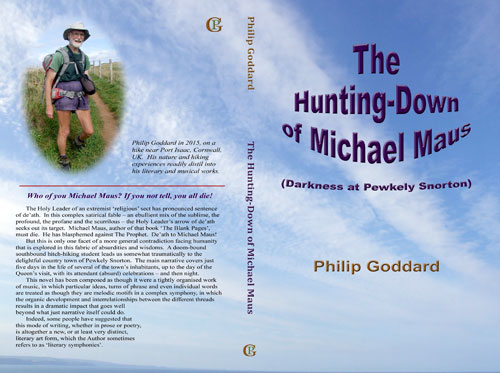
Who of you Michael Maus? If you not tell, you all die!
The Holy Leader of an extremist ‘religious’ sect has pronounced sentence of de'ath (sic). In this complex satirical fable — an ebullient mix of the sublime, the profound, the profane and the scurrilous — the Holy Leader's arrow of de'ath seeks out its target. Michael Maus, author of that book ‘The Blank Pages’, must die. He has blasphemed against The Prophet. De'ath to Michael Maus!
But this is only one facet of a more general contradiction facing humanity that is explored in this fabric of absurdities and wisdoms. A doom-bound southbound hitch-hiking student leads us somewhat traumatically to the delightful country town of Pewkely Snorton. The main narrative covers just five days in the life of several of the town's inhabitants, up to the day of the Queen's visit, with its attendant (absurd) celebrations — and then night…
N.B. For better or worse, death
and de'ath
are not the only words that are
switched in this novel!
2. Dead Pigs
(216pp, completed in 1990)
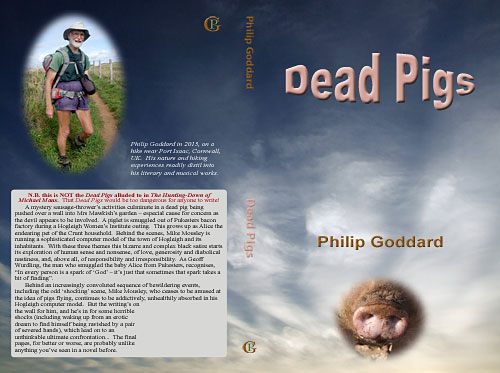
A mystery sausage-thrower's activities culminate in a dead pig being pushed over a wall into Mrs Mawkish's garden — an especial cause for concern as the devil appears to be involved. A piglet is smuggled out of Pukesters bacon factory during a Hogleigh Women's Institute outing. This grows up as Alice the endearing pet of the Crunt household.
Behind the scenes, Mike Mousley is running a sophisticated computer model of the
town of Hogleigh and its inhabitants. With these three themes this bizarre and complex black satire
starts its exploration of human sense and nonsense, of love, generosity and diabolical nastiness,
and, above all, of responsibility and irresponsibility. As Geoff Wurdling, the man who smuggled the
baby Alice from Pukesters, recognises, In every person is a spark of ‘God’ — it's just that
sometimes that spark takes a bit of finding
.
Once again there are reports that the ARA is extending its terrorist campaign from Northern Animalrightsland to the British mainland. As though that were not enough for the police to contend with, some of the most decent of Hogleigh's policemen are killed in a Poll Tax riot: PC George Crunt meets a particularly shocking and grisly death at the hands of a band of skinheads. Local opposition to Alice (yes, the pet pig), with a pub-bombing incident along the way, culminates in a lynching in which Alice is hanged — an undignified and harrowing scene.
Many Hogleigh inhabitants experience unaccountable changes in their lives — mostly
for the worst — accompanied by an apparent rewriting of aspects of their past. In this connection
we see a tragic downturn affect Geoff Wurdling, starting with a strangely retrospective sacking and
the loss of his friend John Chicktrusser in a terrifying thunderstorm on Darkmoor (sic).
Among other strange occurrences, we even observe the whole congregation plus preacher at Agnus Dei
church turn into sheep. Rest assured, they don't find it very funny. (Stop giggling, you!
![]() )
)
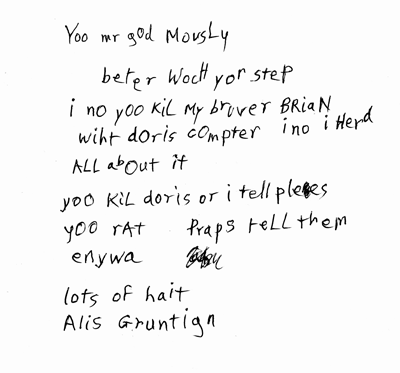
Behind all these happenings, Mike Mousley, who ceases to be amused by the idea of pigs flying, continues to be addictively, unhealthily absorbed in his Hogleigh computer model. But the writing's on the wall for him, and he's in for some horrible shocks (including waking up from an erotic dream to find himself being ravished by a pair of severed hands), which lead on to the unthinkable ultimate confrontation… The final page or two, for better or worse, is probably unlike anything you've seen in a novel before.
N.B. This novel is not the ‘Dead Pigs’ by Michael Maus, alluded to in the first novel. That ‘Dead Pigs’ would be too dangerous for anyone to contemplate writing — much as even now the Author would love to write it if only he had the time and didn't mind being summarily beheaded or shot / exploded into pieces by some extremely silly people for his string of alleged blasphemies and insults to the devoutly religious and supposedly ‘Holy’ idiots of this crazy world!3. The Awful Destiny of Physalia Gorgon
(Here We Come Gathering NUTS in May)
(214pp, completed in 1991)
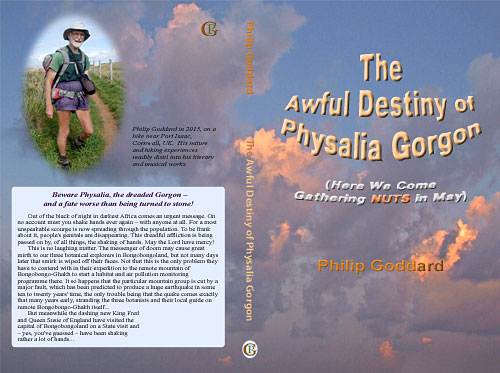
Out of the black of night in darkest Africa comes an urgent message. On no account must you shake hands ever again — with anyone at all. For a most unspeakable scourge is now spreading through the population. To be frank about it, people's genitals are disappearing. This dreadful affliction is being passed on by, of all things, the shaking of hands. May the Lord have mercy!
This is no laughing matter. The messenger of doom may cause great mirth to our three botanical explorers in Bongobongoland, but not many days later that smirk is wiped off their faces. Not that this is the only problem they have to contend with in their expedition to the remote mountain of Bongobongo-Ghakh to start a habitat and air pollution monitoring programme there. It so happens that the particular mountain group is cut by a major fault, which has been predicted to produce a huge earthquake in some ten to twenty years' time, the only trouble being that the quake comes exactly that many years early, stranding the three botanists and their local guide on remote Bongobongo-Ghakh itself…
But meanwhile the dashing new King Fred and Queen Susie of England have visited the capital of Bongobongoland on a State visit and — yes, you've guessed — have been shaking rather a lot of hands…
So it comes to pass that the unmentionable affliction spreads throughout the world, bringing strife and turmoil in its wake — until everybody surviving the various suicides, massacres and executions is now free of the encumbrance of these wretched genital things and all the complications that they bring.
Life takes on a new childlike simplicity (admittedly with certain complications), genitals are forgotten, and History is suitably amended or ignored. That is, until… Of course rumours have never really stopped — for example, of evil tribes of cannibal savages in remote tropical countries who somehow inconsiderately retain the mysterious things between their legs, and who, it's said, can pass on their disgusting affliction and habits by means in keeping with their sordid and alien character. But then one Sunday night best forgotten — Oh, the shame! — …
Meanwhile, eleven years after their rescue from Bongobongo-Ghakh, our three (well, actually now four) botanists, now on an expedition to remote mountains in Nogonogoland, are overtaken by events and discover just how hot it can become in darkest Africa. And finally, the touching irony of the novel's ending culminates in a last sentence that must surely go down as a classic.
But heed this warning. In the course of this apocalyptic narrative (or lot of old
balls, depending on your viewpoint) you will encounter a freak with such hideous and dreadful
pedigree that you may be turned to stone on the spot or have some other terrible effect or
corruption visited upon you. In particular, whatever you do, don't attempt to picture the face of
that fateful monster. You have been warned. ![]()
4. Still Life with
Strangled Porcupines
(Le Pain de la Solitude)
(225pp, completed in 1992)
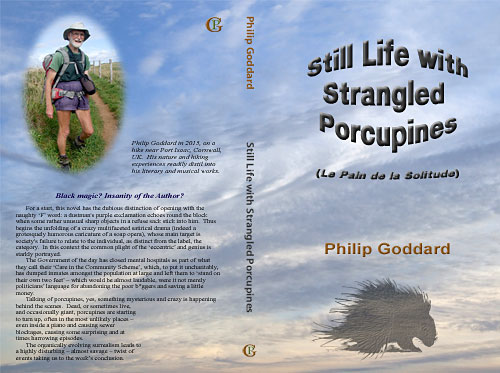
This novel has the dubious distinction of opening with the naughty ‘F’ word: a dustman's purple exclamation echoes round the block when some rather unusual sharp objects in a refuse sack stick into him. Thus begins the unfolding of a crazy multifaceted satirical drama (indeed a grotesquely humorous caricature of a soap opera), whose main target is society's failure to relate to the individual, as distinct from the label, the category. In this context the common plight of the eccentric and genius is starkly portrayed.
The Government of the day has closed mental hospitals and old people's homes as part of what they call their ‘Care in the Community Scheme’, which, to put it uncharitably, has dumped inmates amongst the population at large and left them to ‘stand on their own two feet’ — which would be almost laudable, were it not merely politicians' language for abandoning the poor b*ggers and saving a little money.
Of the various central characters the most central is Tim Bawlscroper, cruelly nicknamed the Polecat — one of a number of ex-inmates from the recently closed-down Tetch Vale mental hospital, who have been parcelled out into Council flats along a street in central Tetchborough. The narrative follows some of Tim's struggles there, starting with his brief love affair with Henry, a very affectionate polecat ferret. But Tim's life isn't a happy one.
Quite apart from continuing verbal bullying from his father on the phone and torment from his lonely frustrated homoeroticism, he is plagued by visitations from demons and very demoralizing angels. But then a porcupine quill mysteriously comes into his life. It appears to have the power to make the demons and angels disappear. Tim soon starts gaining success and public recognition as one of this century's greatest painters — even to the extent of beginning to overshadow such masters as Pablo Picrasso and Salvador Dalek. Nonetheless, as though cursed by ‘God’, he still has a dark and desolate cross to bear…
Gossip abounds in and around the older people's flats across the road from the Tetch Vale flotsam. From sharp things in refuse sacks to the most unfortunate death of Mrs Bugler after a lavatory blockage; from the local ‘Archimedes’ to the alarming exploits of the Singing Woman; and from a disgraceful affair between two real ‘oldies’ to the perplexing matter of the elusive and mysterious new tenant of 2b Badgworthy Court — a certain Tony Volefondler, who nobody seems ever to encounter despite intermittent signs of somebody being present in that flat.
Talking of porcupines, yes, something mysterious and crazy is happening behind the scenes. Dead, or sometimes live, and occasionally giant, porcupines are starting to turn up, often in the most unlikely places — even inside a piano and causing sewer blockages. Black magic? Insanity of the Author?
Well, any answers that do come are provided in the form of further, quite unexpected riddles. The whole process of organically evolving ‘symphonic surrealism’ brings about a really disturbing — even savage — turn of events that leads us to the mind-boggling multiple enigma of the work's ending.5. Three Blind Executioners
(Betrayal and Crucifixion of Climber on Mount Everest
Just 174 Metres Short of the Summit, Without Oxygen)
(253pp, completed in 1993)

On what is destined to be remembered as Good Saturday, darkness and earthquake come to Dave Unglebury's very own town of East Thruxted; he has chanced upon the lynching and crucifixion of Fred, the purported new Messiah. On the Third Day an extraordinary letter arrives amongst Dave's mail, resurrecting a childhood ambition of his; it's an invitation to join a team of eminent mountaineers to ascend a new and extremely challenging route up the South-West face of Mount Everest. The catch is that Dave is no mountaineer and can't imagine why such an invitation has come his way — except for the possibility that a monumental boob has occurred as a result of the similarity of his name to that of a very famous mountaineer, Dave Inglebury. Unbelievably, however, when the ‘error’ is pointed out to the team organiser, he insists that there is no error, both Daves being in the computer list, and indeed both having been invited.
More for a bit of a laugh than anything, the non-mountaineer Dave (who at least did climb a few Lake District crags and walk up Ben Nevis a couple of times in his youth), prompted and spurred on by his wife, Jane, decides to play along with what still has to be an almighty cockup. Jane is soon included in the invitation, and the two incredulously find themselves increasingly committed to going. The whole thing becomes more and more like a weird dream, the upper reaches of the ascent of Everest drifting into the realms of hallucination.
But what could have been purely a light-hearted romp of a story — and is indeed permeated with the author's characteristic mischievous humour — is disturbed and troubled by shadows and undercurrents. For example we eventually discover that the relationship of Dave and Jane isn't what it had seemed all along; on the surface the marriage was intended as something of a protection for Jane from various erstwhile suitors, and for Dave from the attentions of a certain Marilèna Flatbladder, who he's still trying to shake off after several years of being on the run from her. And, marital problems aside, one particularly shady undercurrent that becomes apparent here and there in the work is an echo of the Nazi persecution of Jews — in particular the Kristallnacht pogrom. What, you may well ask, has this latter to do with a duck by the name of Eric?
It's not giving too much away to say that one of the villains in the piece is East Thruxted Social Security office. And another thing that spawns a few problems is the aftermath from the new Crucifixion, which is already beginning to surface…
The ambiguity implicit in the novel's title, which in the first instance refers to Dave's phobia of mice, is the starting point of a surrealistic linking of images that cloak the narrative with mystery and menace, leading us through a succession of phantasms and bogeys, which culminates in the final denouement that's suggested in the subtitle. This is the focus for a startling — even traumatic — fusion of title and subtitle images in an unexpected way. And the betrayal referred to is only the last of several betrayals and let-downs that beset Dave on his progress toward the highest point on earth to which Man can aspire…
6. Forbidden Flood Warning
(The Bishop's Little Wet Dream)
(138pp, most written in 1994; completed in 2015)

The new ‘Noah’, Edmund McFardle, is something of a national laughing stock, for he continues building his truly enormous ark on Scottish moorland at the top of Ballyhooly Hill (altitude some 200 metres) despite the decade-old drought. Nonetheless, McFardle isn't altogether alone in seeing the calamitous drought as one of God's signs of very different things to come. Throughout Britain all manner of religious sects are in one way or another seeking to convert those who are surviving the drought to their particular beliefs, supposedly to save them from the imminent end of the world and Day of Reckoning.
The Government of the day has set up a Department of Family Values, more widely known as the Ministry of Morals, to help promote the core of their Back to Basic Victorian Values policy. Being a caring government they have once again ‘targeted help more effectively to those most in need’, which on this occasion means that they have drastically cut taxes for the better paid and more or less totally abolished services and benefits for poorer people, so leaving the latter to die because they can't pay for food, let alone water, which latter now costs more than petrol.
Desperate young people are roaming the streets carrying out a new sort of mugging: one in which the victim is used as the source of a drink of blood. And, to cap it all, the Government, having privatized just about everything else in sight, are now preparing the population for the privatization of air. Yes, you can at least sympathize with those nuts who are talking about the end of the world and God's retribution upon Man for his thoughtless and wicked ways.
It is against this background that the gentle and affable Geronwy Bishop takes his annual holiday in Ballyhooly, soon finding himself the subject of an entertaining scandal and then gaining first-hand acquaintance of the legendary ‘Noah’. He enjoys his stay so much that he returns the following year, by which time the rains have started and local flooding is becoming more and more of a problem.
One day during that holiday the heavens open more purposefully than hitherto and the flood waters rise to float the ark in some two hours as though through some miracle of God's wrath. You may well wonder why it is that Geronwy is saved from the flood by ‘Noah’ when the whole point of the flood and the ark was surely supposed to be to eliminate all humans but ‘Noah’, his sons and their wives. Well, yes, an answer to that does emerge in the fullness of time — a decidedly tasteless one as it happens, or indeed maybe tasty, depending on your particular preferences and taboos. In any case it's Jeoffry the cat, one of the stars of our narrative, who has the final desolate word.
Overall, this little fable functions as a biting satire on uncontrolled, rampant religious fanaticism. That is made all the more biting through its particularly strong humorous element, which latter also gives extra force to the odd ‘shocking’ scenes. It has the strange distinction of being ‘framed’ and cut by scenes adapted / metamorphosed from paintings by the Italian Giorgio de Chirico, and, in the odd place an admixture of a Salvador Dalí element.
It also has a small but significant and somehow feline debt to the poet Christopher Smart, from his poem Jubilate Agno (Rejoice in the Lamb), and a decidedly chilling debt to the poet Wilfred Owen (The Parable of the Old Man and the Young), and, perhaps unsurprising in the circumstances, a distinct echo of the biblical account of Belshazzar's feast, so strikingly portrayed in the choral music work Belshazzar's Feast by William Walton.
The Short Stories
The Collected Short Stories
(Of Squoggle and Nothings and Sheepish Shenanigans)
(209pp — 14 stories, from genuinely short to novella-length, 1981–92)
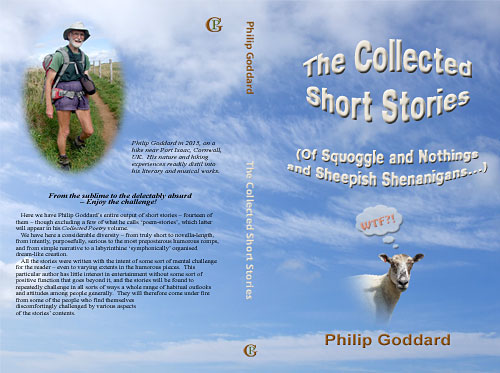
From the sublime to the delectably absurd — Enjoy the challenge!
Here we have the Author's entire output of short stories — fourteen of them — though excluding a few of what he calls ‘poem-stories’, which latter are included in his Collected Poetry volume. They were written from 1981 to 1992.
This collection embraces a considerable diversity — from truly short to novella-length, from intently, purposefully, serious (albeit still with a certain humour) to the most preposterous overtly humorous romps, and from simple narrative to a labyrinthine ‘symphonically’ organised dream-like creation (enter Nothing, Sweet Nothings!).
All the stories were written with the intent of some sort of mental challenge for the reader — even to varying extents in the humorous pieces, and satire often raises its cheeky head (or indeed backside or middle finger, as appropriate), no matter whether the story is supposedly serious or humorous. This particular author has little interest in entertainment without some sort of positive function that goes beyond it, and the stories will be found to repeatedly challenge in all sorts of ways a whole range of habitual outlooks and attitudes among people generally. They will therefore come under fire from some of the people who find themselves discomfortingly challenged by various aspects of the stories' contents.
Find perhaps a friend's, a relative's, or even your very own parental behaviour being shown up starkly for what it is, in A Squoggle Comes Home to Roost. Sit in with Rodney (Nothing, Sweet Nothings) to experience from an unusual viewpoint, laced with black humour, the monumental absurdity of the couch potato's life, forever watching TV and having no notion of there being anything worthwhile for which to live an active life. See some of the absurdities that everyone takes for granted without question in the traditional biblical Christmas story, with a more up-to-date scenario of that sort (Madonna with Child).
Enjoy the entertaining / disturbing ‘what if’ scenarios of Tasty Morsels (Danish pastries
with other ideas than being eaten), and The Man Who Turned Into a Shoe. For the fireside at
Halloween we have a nice little tale (Dark Horse) with a particularly disturbing element.
And, quite absurd, one might think, two young ‘gay’ men having a stay in the guest house of a
Benedictine monastery (WTF??!) Probably best to just blush and turn away from that one
(A Monastic Weekend), which figuratively raises the frocks of the monks and indeed the whole
establishment; what on earth could have been in the Author's mind to write such a piece? What is
the world coming to, with authors like this on the loose? ![]()
The Poetry
The Horizon Watcher — The Collected Poetry
(262pp — 133 poems, including a few ‘poem-stories’, 1973–95)

From the absurd to the visionary — Enjoy the challenge!
Here we have Philip Goddard's entire output of poetry (including several ‘poem-stories’) — at least, what remains after various extensive purges over the years.
A stimulating and invigorating set of poetry, in which each poem is some sort of experiment in organising words and language to portray both simple ‘physical’ pictures and to explore within the processes of the mind itself and often to create visionary experiences out of what underlies or sits between our regular thoughts and imaginings. Surrealism becomes particularly powerful and purposeful in the more ‘advanced’ poems.
Entrenched, socially inculcated outlooks and beliefs, including religious ones, are held up to critical scrutiny, often being played about with, being looked at in quizzical ways and challenging contexts. Even true hells (of which the Author has much experience and an apparently uniquely deep understanding) are visited, though generally with a certain mischievous sense of humour.
As well as an explanatory preface, annotations are provided here and there (after the respective
poems, so as not to interfere with the reading experience) to explain points that are liable to
mystify or confuse many readers, and to add some usefully informative contextual notes. Those who
don't want to go beyond conventional poetry in regular rhyming verses and regular meter, or/and
contained within an atmosphere of a genteel hushed preciousness, would do well to look elsewhere!
![]()
Please note that this collection now has three more recent poems added, to bring it completely up to date, including a topical new poem written in 2022 (For Ukraine – A New Painting On My Wall, In Which…)


